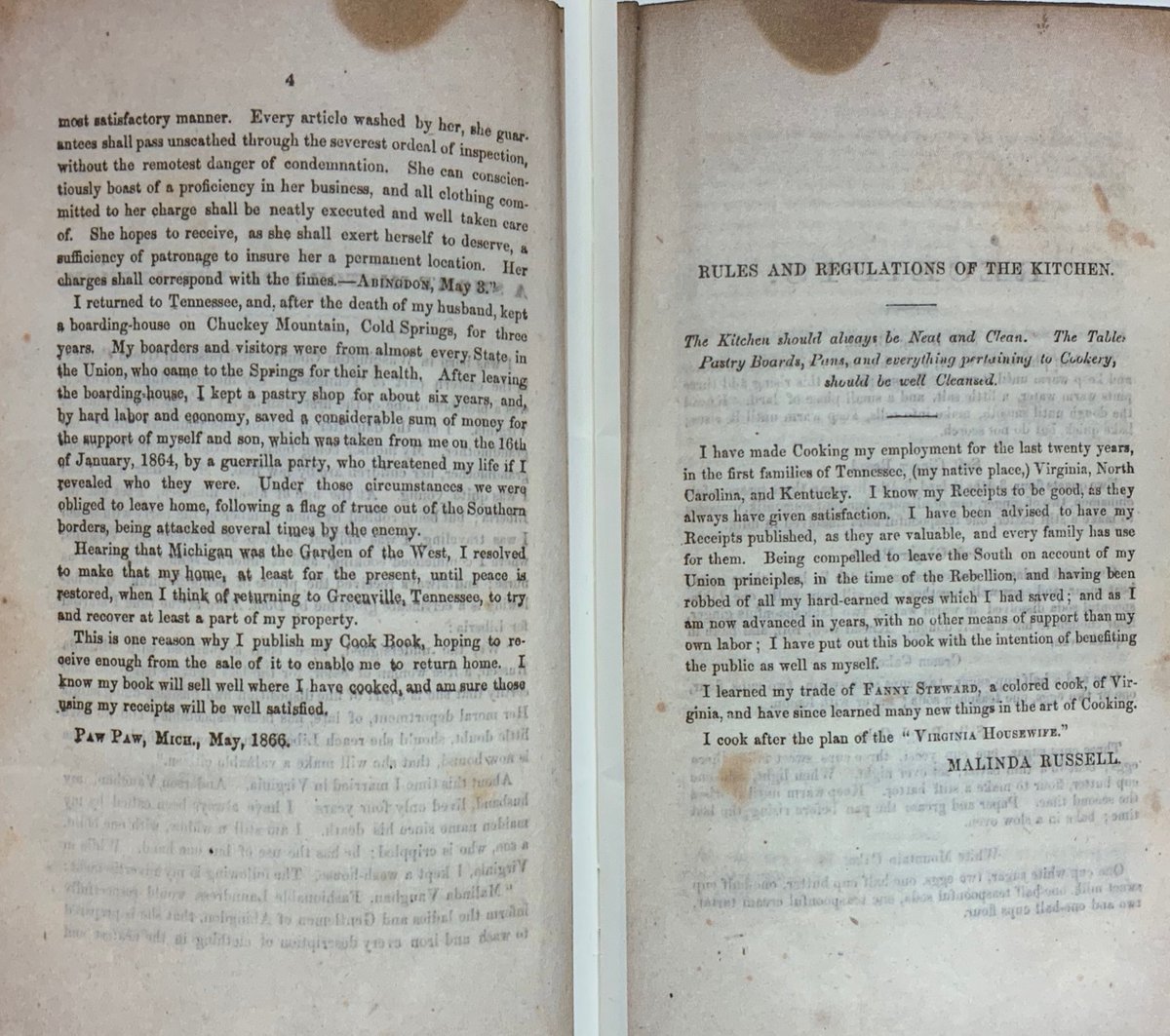Malinda Russell is the first recorded African American to have published a cookbook dedicated solely to cooking AND the first African American woman to publish a book of any genre #foodstudies20
A Domestic Cookbook was lost to history until it resurfaced in a California home in 2001. Jan Longone’s article, “Early Black-Authored American Cookbooks,” introduced Malinda Russell to the scholarly culinary community in the inaugural issue of Gastronomica in 2001 #foodstudies20
You can read Longone's 2001 article in full, sans paywall, here
https://online.ucpress.edu/gastronomica/article/1/1/96/93431/Early-Black-Authored-American-Cookbooks #foodstudies20
https://online.ucpress.edu/gastronomica/article/1/1/96/93431/Early-Black-Authored-American-Cookbooks #foodstudies20
Thus far, scholarly accounts of Russell’s life and work have not adequately addressed nor emphasized her story of movement, culinary entrepreneurship, and, above all, resilience #foodstudies20
As a food studies scholar, I first searched ways of enhancing the cookbook and recipes in hopes that some ingredient or term would stand out and enlighten me to the details of Russell’s life #foodstudies20
Although it is under maintenance and the updated version will be deployed later this summer, this is a link to the digital recipe glossary I made using Twine https://www.malindarussell.willcut2.msu.domains/ #foodstudies20
The digital project allowed me to rearrange her recipes and to connect them by ingredient and method. http://Twinery.org offers a web-like framework for creating a website, which was perfect for exploring a cookbook #foodstudies20
As a historian, I have been busily reconstructing Russell’s world based on what I know of the sociopolitical and cultural milieu of the places she called home. What can her experience as a 3rd gen. free black woman in the South tell us? #foodstudies20
Finding Russell’s story requires reading “against the bias,” to borrow a term from Marisa J. Fuentes’s Dispossessed Lives: Enslaved Women, Violence, and the Archive (2016)- the monograph has inspired my work since I first read it #foodstudies20
Fuentes’ research on black women in Barbados revealed the need to read archival sources “against the bias,” she is using the textile term and not referring to an absence of objectivity, although both may be fitting here #foodstudies20
Cutting fabric against the bias–a technique used to expand the fabric by cutting across its natural weave. African American women have historically been left out of the archive and, for this reason, we must expand on the meaning of the sources surrounding them #foodstudies20
A Domestic Cookbook was published in 1866 by the True Northerner, a Republican newspaper in Paw Paw, Michigan. The newspaper’s office was destroyed in a fire and, with it, all possible records of Russell’s involvement with the paper #foodstudies20
In 1866, the new(ish) Republican party was strongly abolitionist w/ ties to Oberlin College. Paw Paw is located in southwestern Michigan which was a significant region for Underground Railroad activity #foodstudies20
Malinda Russell does not exist in any archive. No birth records, bills of sale, photographs, deeds, or death records. Her cookbook with a brief autobiography is the sole record of her life #foodstudies20
It may come as a surprise, then, that papers and documents have become integral to telling Russell’s story. Although the documents she mentions are lost, the meaning behind them can be found #foodstudies20
Malinda Russell included a brief autobio in the front of her cookbook. These photos are my own, taken from a facsimile version @msulibraries More historical cookbooks can be found here: https://lib.msu.edu/spc/collections/cookery/ #foodstudies20
When she was 19, Russell planned to relocate to the colony of Liberia in West Africa. She never made it, but was instead robbed by a member of her traveling party and “obliged to stop in Lynchburg, Virginia.” #foodstudies20
Russell was born free, but free black men and women posed a significant perceived threat to slave owning whites who found it easier to maintain a slave society w/o dealing head-on w/ the ambiguities of personhood #foodstudies20
Even white abolitionists who did not believe in slavery did not always think it appropriate to coexist with free African Americans. Perhaps because it meant they could not ignore the violence perpetuated by the peculiar institution of slavery #foodstudies20
However, would-be colonists had to meet specific requirements, including having a sponsor. Malinda's sponsor would have been Doct. More, who wrote the letter attesting to her character and work ethic that she included in her autobiography #foodstudies20
No one is sure who Doct. More is (yet) but what I want to draw attention to the meaning behind Malinda's carrying this letter of recommendation with her into Paw Paw, where she published her cookbook #foodstudies20

 Read on Twitter
Read on Twitter



